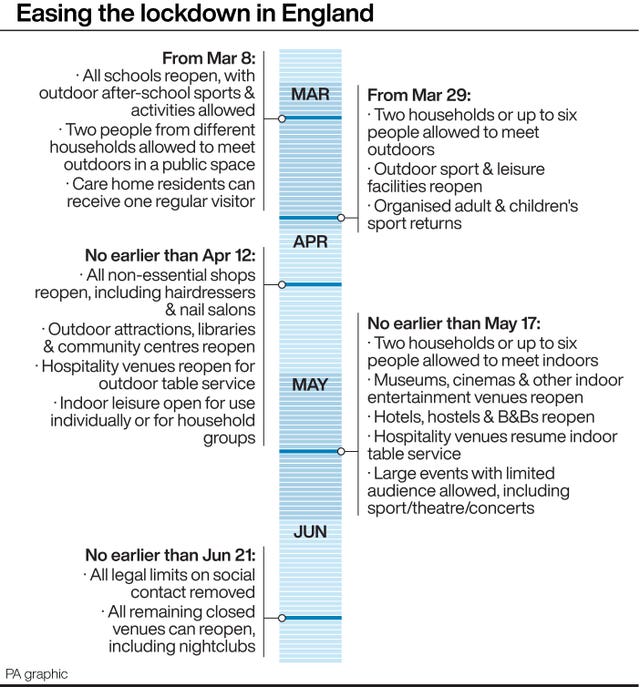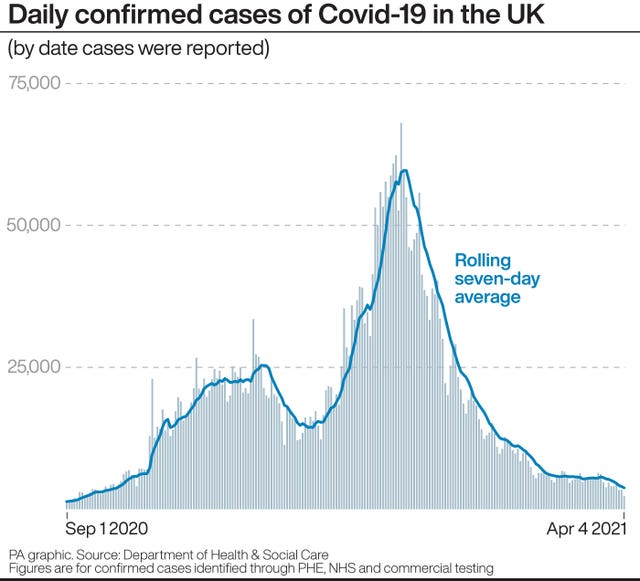Putting vaccine passports into law would be a “nightmare” and require “enormous scrutiny”, an expert has warned.
Danny Altmann, professor of immunology at Imperial College London, told Times Radio on Monday that while in general they were a good thing if they made people feel a bit safer and more people were vaccinated, they needed “enormous scrutiny”.
He said: “I find it difficult to have the vaccine passport conversation, and I’ve had quite a lot of these discussions of policy advice level, without getting into the detail because who of us wouldn’t think that vaccine passports were in general, a good thing, if people felt a bit safer and more people were vaccinated and we had more assurance of that?
“And yet, one or two sentences into discussion you get rather sort of bogged down at the devil is in the detail, and there are an awful lot of confounders there where you could make some very, very poor legislation.”
Asked if vaccination passports will require new laws which could be difficult to word correctly, Prof Altmann added: “I think the detail is an absolute nightmare and, without being pedantic or negative, requires enormous scrutiny.”
She told BBC Radio 4’s Today programme: “We have an amazing take-up of the vaccine, it is being rolled out incredibly successfully by the NHS – it is not totally clear to me that we need a sledgehammer to crack a nut here.
“So we will see what the Government bring forward and their rationale for it – we’ll keep an open mind but at the moment we have many reservations around what the Government looks like it might be suggesting.”
Prime Minister Boris Johnson is set to chair a virtual meeting of the Covid O committee before briefing the full Cabinet on the arrangements for the latest phase of lockdown lifting which will see non-essential shops in England reopen from April 12.

Health minister Edward Argar denied that the Government had changed its mind on the use of so-called vaccine passports with vaccine minister Nadhim Zahawi previously calling them discriminatory.
Asked on BBC Breakfast whether the Government had changed its mind, Mr Argar said: “I don’t think it is that at all.
“I think it is right that we look at this and see if there is a way that, while balancing all of those practical, ethical and fairness considerations, is there a way this could, in the short term, speed up our reopening of the country and getting back to doing the things we love?”
While there is relief among MPs at the prospect of the economy reopening, there is concern among some about the proposals for the “Covid status certification” scheme dubbed “vaccine passports”.
More than 40 Tory MPs have signed a cross-party letter opposing vaccine passports while Labour leader Sir Keir Starmer has described them as “un-British”, raising the prospect of a potential Government defeat if – as expected – there is a Commons vote.
Ministers insist the certificates – which could be a mobile phone app or a paper document – will never be required for essential services such as supermarkets, public transport or GP surgeries.
Initially, at least, they will also not be necessary to go to pubs or restaurants as they begin serving again.

Initially they will not involve the use of certificates although spectators will be required to be tested for Covid-19 both before and after the event.
Mr Johnson will also use the news conference – a year to the day after he was admitted to hospital with Covid-19 – to set out further details for easing foreign travel restrictions.
While the ban on foreign travel from England will not be lifted before May 17, Downing Street has said that when the rules are relaxed there will be a risk-based “traffic light” system with red, amber and green ratings for countries around the world.
Travellers arriving from countries rated green will not be required to isolate although pre-departure and post-arrival tests will still be needed.
For those classed as amber or red, the restrictions will remain as they are, with arrivals required to isolate or enter quarantine.
Officials have made clear that there will be no announcement this week on which country is on which list – a decision which has been criticised by tourism industry bosses.
Mr Argar said the Prime Minister would be trying to give “as much foresight and as few surprises as possible” about the possibility of international travel this year during his press conference on Monday.
Hairdressers and barbers can reopen in Scotland from Monday, a week earlier than in England.
Some non-essential shops can also reopen, including garden centres and homeware stores, while university and college students will return for in-person teaching and outdoor contact sports can restart for youngsters aged 12 to 17.






